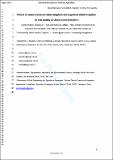Por favor, use este identificador para citar o enlazar a este item:
http://hdl.handle.net/10261/345309COMPARTIR / EXPORTAR:
 SHARE SHARE
 CORE
BASE CORE
BASE
|
|
| Visualizar otros formatos: MARC | Dublin Core | RDF | ORE | MODS | METS | DIDL | DATACITE | |

| Título: | Medium-long term effects of saline reclaimed water and regulated deficit irrigation on fruit quality of citrus |
Autor: | Romero-Trigueros, Cristina; Alarcón Cabañero, Juan José CSIC ORCID; Nortes, Pedro Antonio CSIC ORCID; Bayona Gambín, José María CSIC; Maestre-Valero, José F.; Nicolás Nicolás, Emilio CSIC ORCID | Palabras clave: | Fruit weight Grapefruit Mandarin Maturity index Organic acid Soluble solid conten |
Fecha de publicación: | feb-2020 | Editor: | John Wiley & Sons Society of Chemical Industry |
Citación: | Journal of the Science of Food and Agriculture 100(3):1350-1357 (2020) | Resumen: | BACKGROUND
Non-conventional water sources and water-saving techniques can be valuable in semi-arid regions, although their long-term effects on citrus quality are little known. This study evaluated the effects of irrigation with two sources, transfer water (TW) and reclaimed water (RW), combined with two irrigation strategies, full irrigation (FI) and regulated deficit irrigation (RDI), on fruit quality of mandarins and grapefruits during eight growth seasons RESULTS Reclaimed water irrigation in mandarin, without water restriction, influenced maturity index (MI) less than TW-FI, because titratable acidity (TA) increased to a greater degree than soluble solid contents (SSC). Nevertheless, juice quality standards were satisfied. Regardless of the irrigation treatment (FI or RDI), a trend towards increasing fruit weight was also detected with RW. In grapefruit, its rootstock (Citrus macrophylla) enhanced salinity resilience with respect to the rootstock of mandarin (‘Carrizo’ citrange) and, hence, MI was not affected by RW. The RDI strategy, without saline stress (TW-RDI), increased, to a similar degree, both SSC and TA in mandarin fruit, not affecting the MI. In grapefruit, the water stress of RDI did improve the MI due to the TA did not change and SSC increased significantly, the TA did not change. The combination of both strategies, RW-RDI, decreased the MI only in some years because TA increased proportionally more than SSC in mandarin CONCLUSIONS The medium- and long-term feasibility of using RW and RDI to irrigate citrus was demonstrated. However, they must be performed cautiously and with appropriate management to avoid damaging fruit quality as a result of phytotoxic elements. © 2019 Society of Chemical Industry |
Versión del editor: | https://doi.org/10.1002/jsfa.10091 | URI: | http://hdl.handle.net/10261/345309 | DOI: | 10.1002/jsfa.10091 | ISSN: | 0022-5142 | E-ISSN: | 1097-0010 |
| Aparece en las colecciones: | (CEBAS) Artículos |
Ficheros en este ítem:
| Fichero | Descripción | Tamaño | Formato | |
|---|---|---|---|---|
| Romero2020JSciFoodAgr.pdf | Articulo principal | 370,6 kB | Adobe PDF |  Visualizar/Abrir |
CORE Recommender
SCOPUSTM
Citations
20
checked on 20-abr-2024
WEB OF SCIENCETM
Citations
16
checked on 29-feb-2024
Page view(s)
9
checked on 23-abr-2024
Download(s)
4
checked on 23-abr-2024
Google ScholarTM
Check
Altmetric
Altmetric
NOTA: Los ítems de Digital.CSIC están protegidos por copyright, con todos los derechos reservados, a menos que se indique lo contrario.
